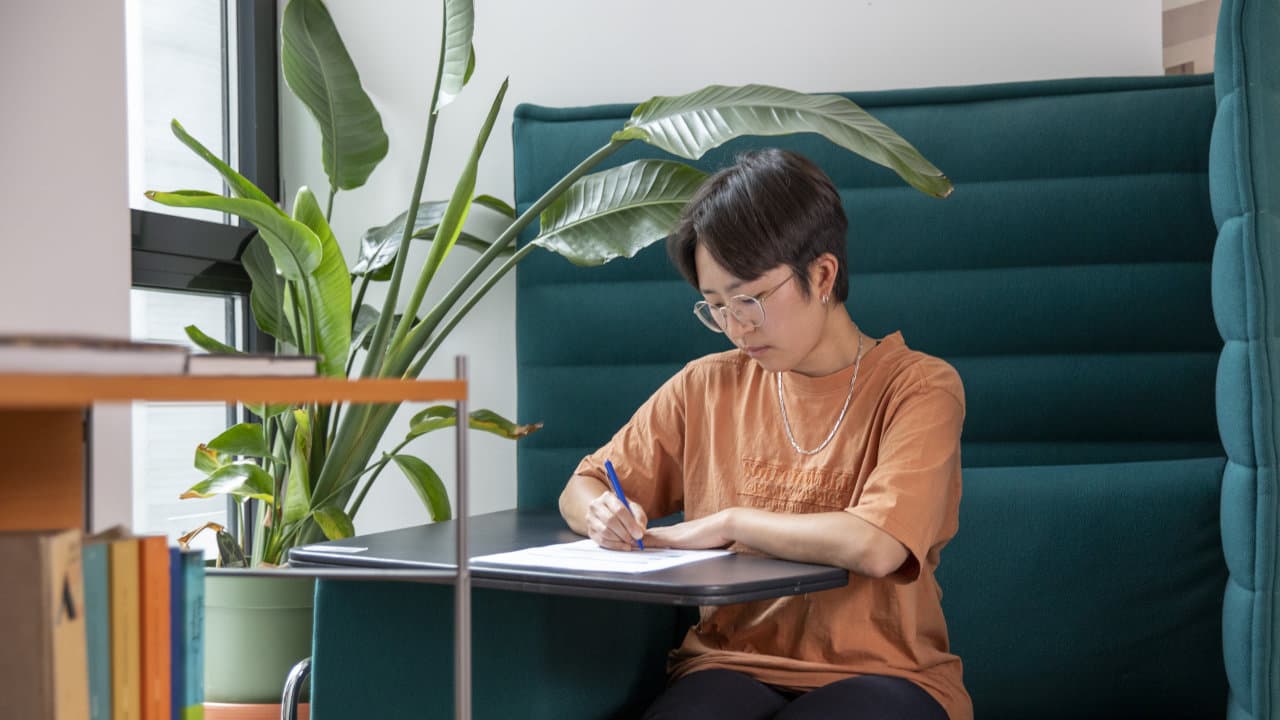Shared accommodation for refugees
What are my rights as a resident?
In shared accommodation, many people live together in a confined space– this can be challenging. There are clear rules and standards to ensure that living together is possible. The staff on site are there to implement these rules and ensure they are adhered to.
What do I need to know?
Who is responsible for what?
- Every facility has its "house regulations" ("Hausordnung") which apply to all of its residents. These rules specify, for example, when one can have visitors or at what time the "Quiet Hours" start in the evenings. The facility’s director is responsible for overseeing the implementation of these rules.
- The security staff are responsible for the safety of the residents and keeping order. That's why they are allowed to control visitors' ID cards. At least one female security employee must always be present at accommodation centres. If you have problems with security, contact the accommodation management and seek support from the social workers.
- The social workers take care of the social matters in the accommodation centre. You can approach these employees whenever you have questions or face challenges. They can assist you, e.g., registering at a day-care centre, searching for a flat or seeking a doctor or counselling centre.
What are my rights?
The accommodation centres must ensure that all their residents feel safe, have their privacy, and know where to get help. In July 2016, the Ministry of Family Affairs along with UNICEF and other organisations, such as Plan International Germany e.V. has developed a program to implement the minimum standards for the protection of children, adolescents and women in refugee accommodation centres and all the centres were required to comply. These standards require children, adolescents and women to be protected from violence and to be guaranteed access to medical and psychosocial care. Besides, in every centre, there should be specific room, in which the children and youth can play and learn together.
The following standards and rights apply to accommodation facilities:
- As a couple or family, you have the right to live together in a room.
- Women can only be accommodated in a room with other women.
- It is your right to have a room with a door lock and key. If you share a room with others, you have the right to a cabinet with a lockable door.
- In general, however, you do not have a choice of room in which you are accommodated. Furthermore, single individuals cannot choose with whom they have to share their room. If you have any problems with your roommates, please contact the social workers or the facility management.
- The centre's management personnel are not allowed to enter your room without your permission.
- No room control is allowed in your absence or without prior notice.
- You have the right to receive visitors during the daytime.
- You should receive fresh towels every week and clean bed linen every other week.
- You must inform the centre's management office if you are going to be absent overnight. If you stay out of the centre for over 3 consecutive nights, the facility may assign your room/bed to another person. Your personal belongings, of course, must be kept safe.
- You have the right to clean, accessible and gender-specific toilets and showers.
- You have the right to healthy, diverse and adequate food. It must not contain pork meat.
- The facility’s management must inform you about your incoming letters daily.
What can I do if my rights are violated?
There are always some accommodation centres that do not adhere to these rules and standards. Much has already been done to improve the situation in all the centres, but there are still shortcomings. If there are problems in your centre and your rights are disregarded, contact a counselling centre or the Refugee Council ("Flüchtlingsrat) in your state. Here you will find a list of counselling centres in your federal state of residence.
If you are insulted, discriminated against, threatened or confronted with sexual, sexualised or physical violence in your accommodation, contact the management of the accommodation or the social workers directly. If they do not help or are in fact part of the problem, then contact a counselling centre. On the website of the Anti-discrimination Office, you will find a list of counselling centres in your area. If you are a woman, you can also visit http://www.frauen-gegen-gewalt.de/and frauenhauskoordinierung.de to seek a counselling session in your language nearby. You can also call the Helpline at 08000-116016. The staff there are available day and night, and they speak many languages.
Can I move out into a flat?
Individuals with a residence permit as “Asylberechtigte*r” (entitled to asylum), “Anerkannter Flüchtling” (recognised refugee) or “Subsidiär Schutzberechtigte*r” (entitled to subsidiary protection) or a residence permit according to §23, §24 or §25 paragraph 3 (Residence Act) have the right to move into their own flat.
You can seek advice on this topic if you do not (yet) have a residence permit or your residence permit is not listed above. You can find counselling centres on our “Local information” page. Enter the city where you live and search for “right of residence” or “legal advice”.
Can I move to another city?
In principle, Persons “entitled to asylum”, “recognised refugees” and those “entitled to subsidiary protection” who receive social benefits from the Social Welfare Office or Jobcenter must remain in the federal state in which they went through their asylum procedure for three years. The federal states can also enforce additional regulations to, for example, oblige the person to remain in the municipality where they lived during their asylum procedure. However, this "residence assignment" („Wohnsitzzuweisung“) is controversial. If you have good reasons why you would like to move to another municipality, you can apply for the revocation of the residence assignment (in accordance with Section 12a (5) sentence 2c Residence Act) at the Immigration Office currently responsible for you and the Immigration Office of the city where you wish to live. You can seek advice from a counselling centre or lawyers in your area.
You can also seek advice on this topic if you do not (yet) have a residence permit or your residence permit is not listed above. You can find lawyers and advice centres in your area on our Local Information page. Enter the city where you live and search for “right of residence” or “legal advice”.
Is it true that I need to get vaccinated against measles?
Yes. According to the Measles Protection Act, everyone who lives in shared accommodation facilities must prove that they are vaccinated against measles. If you have not yet been vaccinated against measles, you must do so within 4 weeks of your arrival. The staff in your accommodation centre will help you further. You can learn more in our chapter "Vaccination".
Important
Check your letters every day. Sometimes you receive letters informing you about important appointments with the migration authorities in the coming days. It is quite crucial that you appear on time on all such dates.
If you are sent to another accommodation centre or have voluntarily moved there, it is necessary to notify the Foreigner's Registration Office ("Ausländerbehörde") and provide them with your new address. Otherwise, you will no longer receive their letters and may miss important dates or deadlines.
Similar topics
Additional links
Violence against women
The support hotline 08000 116 016 for the victims' of violence against women is accessible round the clock and free of charge in 17 languages.
Federal Refugee Council
To find legal advice, you can contact the Federal Refugee Council in your state.
Local Counselling
Find a pro Asyl counselling centre in your city.
Our community in the forum
Quickly find answers to any question. Benefit from the experience of your community and exchange ideas.
Support on site
Are you looking for counseling centers, meeting points, and other services? Use our search engine.







